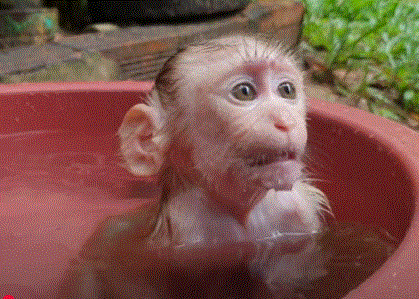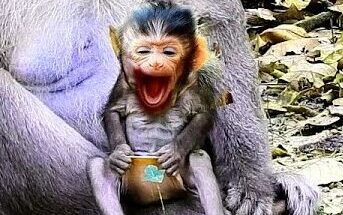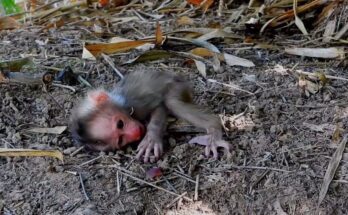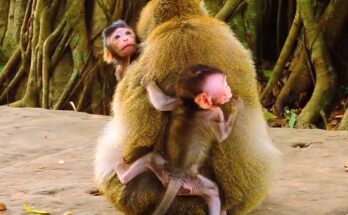In the heart of Cambodia’s Angkor Wat forest, where ancient stones stand as silent witnesses to centuries of history, a tender and unforgettable moment unfolded. Baby monkey Yoya, just a few months old, was about to experience something new—her very first bath in a forest pond, under the watchful eyes of her mother and the soft golden light of the early morning sun.

The forest was alive with sounds—the distant calls of other macaques, the gentle rustling of leaves in the wind, and the soft gurgle of water flowing over mossy stones. Amid this serene chaos, Yoya approached the pond hesitantly. Her tiny paws trembled as they touched the cool surface, sending delicate ripples outward. She froze for a moment, captivated by the reflection of the sunlight dancing on the water.
Her mother, a calm and loving macaque named Mira, stayed close by, her gaze never leaving Yoya. She had been through countless mornings like this with older siblings but this moment felt different. There was something magical about seeing Yoya’s wide-eyed curiosity, her small body trembling with excitement and awe, as she discovered the water for the very first time.
Yoya dipped her hands deeper, letting the water splash over her tiny arms. A squeak of delight escaped her lips, echoing softly through the forest. Mira responded with a gentle nudge, encouraging her daughter to explore further while keeping her safe. Yoya’s laughter—or as close as a baby macaque’s squeaks can sound like laughter—was infectious. Even the older monkeys in the vicinity paused, momentarily captivated by the young one’s innocence.
The pond, though small, seemed enormous to Yoya. She waded carefully, testing the depth, tilting her head as if questioning every ripple and reflection. The sunlight filtering through the dense canopy above painted her fur in shades of gold and brown, making her look like a tiny, living jewel amid the ancient ruins. Every splash she made seemed to harmonize with the whispers of history surrounding her.
At one point, Yoya lost her balance and tumbled backward, landing with a soft splash. For a moment, time seemed to freeze. Mira immediately leaned forward, her arms ready to catch her child, but Yoya surprised everyone—she giggled, shook off the water, and climbed back onto the mossy bank on her own. There was a spark of determination in her tiny eyes, a fierce little spirit that refused to be intimidated by even the simplest of challenges.
Visitors who happened to be near the ruins were captivated. Some reached for their cameras, careful not to disturb the delicate scene, knowing they were witnessing something truly special. Others just stood in awe, letting the experience sink in—the pure, unfiltered joy of a baby discovering the world.
Yoya’s bath became more than just a playful activity. It was a lesson in courage, a celebration of life, and a reminder of the beauty in simple moments. Every splash, every cautious step, every curious glance in the water mirrored the way humans often feel when encountering something new for the first time—hesitant, curious, excited, and ultimately transformed.
As the morning sun climbed higher, Yoya finally climbed onto her mother’s back, her tiny body still glistening with droplets of water. Mira groomed her gently, licking the remaining wet fur and whispering silent reassurances in the way only a mother could. Yoya rested her head on Mira’s shoulder, her tiny eyes sparkling with satisfaction and a newfound confidence.
The Angkor Wat forest held its breath, as if honoring this tender moment. The ancient stones, weathered by centuries of storms and sunshine, stood as silent witnesses to the enduring cycles of life—reminding everyone that even amidst history, life continues to find its way, full of wonder and beauty.
This moment, now captured in video and photographs, has touched hearts across the globe. It’s a gentle reminder that even the smallest creatures, with their simplest joys, can inspire awe, teach lessons in bravery, and bring smiles to the most stressed hearts.


